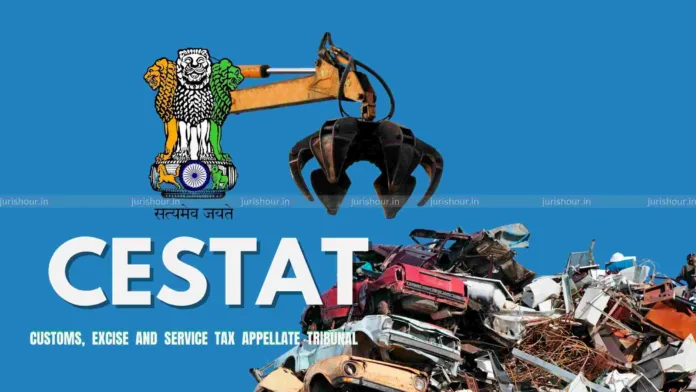The Customs, Excise & Service Tax Appellate Tribunal (CESTAT), Mumbai has held that the customs department cannot enhance the value of scrap based on assumed future use and has ordered a refund to importer.
The bench of Dr. Suvendu Kumar Pati, (Judicial Member) and Anil G. Shakkarwar (Technical Member) overturned an order that had reclassified the company’s imported “Heavy Melting Scrap” as “serviceable used iron pipes, rusted and corroded,” leading to a substantial increase in the assessable value, imposition of a Rs. 3 lakh redemption fine, and a ₹50,000 penalty.
The dispute arose when Shreem Worldwide imported a consignment from the UAE in January 2013, declaring it as Heavy Melting Scrap at a value of ₹19.42 lakh (US $380 per metric tonne) and paying the applicable customs duty. A 100% examination by Docks Officials at Nhava Sheva revealed the goods as “used iron pipes, rusted and corroded, cut at 15 ft. lengths,” deemed serviceable by customs authorities. The weight was found to be marginally higher—by 455 kg, about 0.54% over the declared figure.
On this basis, customs rejected the declared value under Rule 12 of the Customs Valuation Rules, 2007, reassessed it at US $620 PMT based on “contemporary imports,” and imposed fines and penalties. The Commissioner (Appeals) later upheld the decision.
However, Shreem Worldwide contested the findings, relying on a Chartered Engineer’s re-examination conducted in March 2013, which confirmed that the pipes were discarded, unserviceable in their current form, and had outlived their utility. Counsel argued that customs’ reliance on speculative future use was flawed, especially without suggesting any process for restoring the rusted and corroded pipes for intended use.
The Tribunal noted several critical shortcomings in the Department’s case. No documentary evidence or specific references were provided to substantiate the US $620 PMT valuation. The Chartered Engineer’s expert opinion—obtained from an empanelled professional—was disregarded in favour of a Docks Officer’s assessment, despite the latter not being based on technical qualifications. The negligible weight variation could not be treated as mis-declaration, as higher weight actually meant higher duty payment.
CESTAT held that the Department’s valuation approach was unjustified, emphasising that goods should be assessed “in the manner in which they are presented” and not on speculative post-processing utility. It distinguished the present case from the precedent cited by customs (Ashok Magnetics Ltd. v. Commissioner of Customs), where goods were still serviceable despite being old and used.
The Tribunal set aside the Commissioner (Appeals)’ order, directing customs to refund any duty, redemption fine, and penalty collected from Shreem Worldwide, along with applicable interest, within two months.
Case Details
Case Title: M/s. Shreem Worldwide Private Limited Versus Commissioner of Customs (Import)
Case No.: Customs Appeal No. 86273 of 2014
Date: 12.08.2025
Counsel For Appellant: Nandini Goel, Advocate
Counsel For Respondent: Dinesh Nanal, Dy. Commissioner
Read More: Fake GST ITC | Delhi High Court Declines to Quash GST Demand Against Trader, Directs Appeal Route

